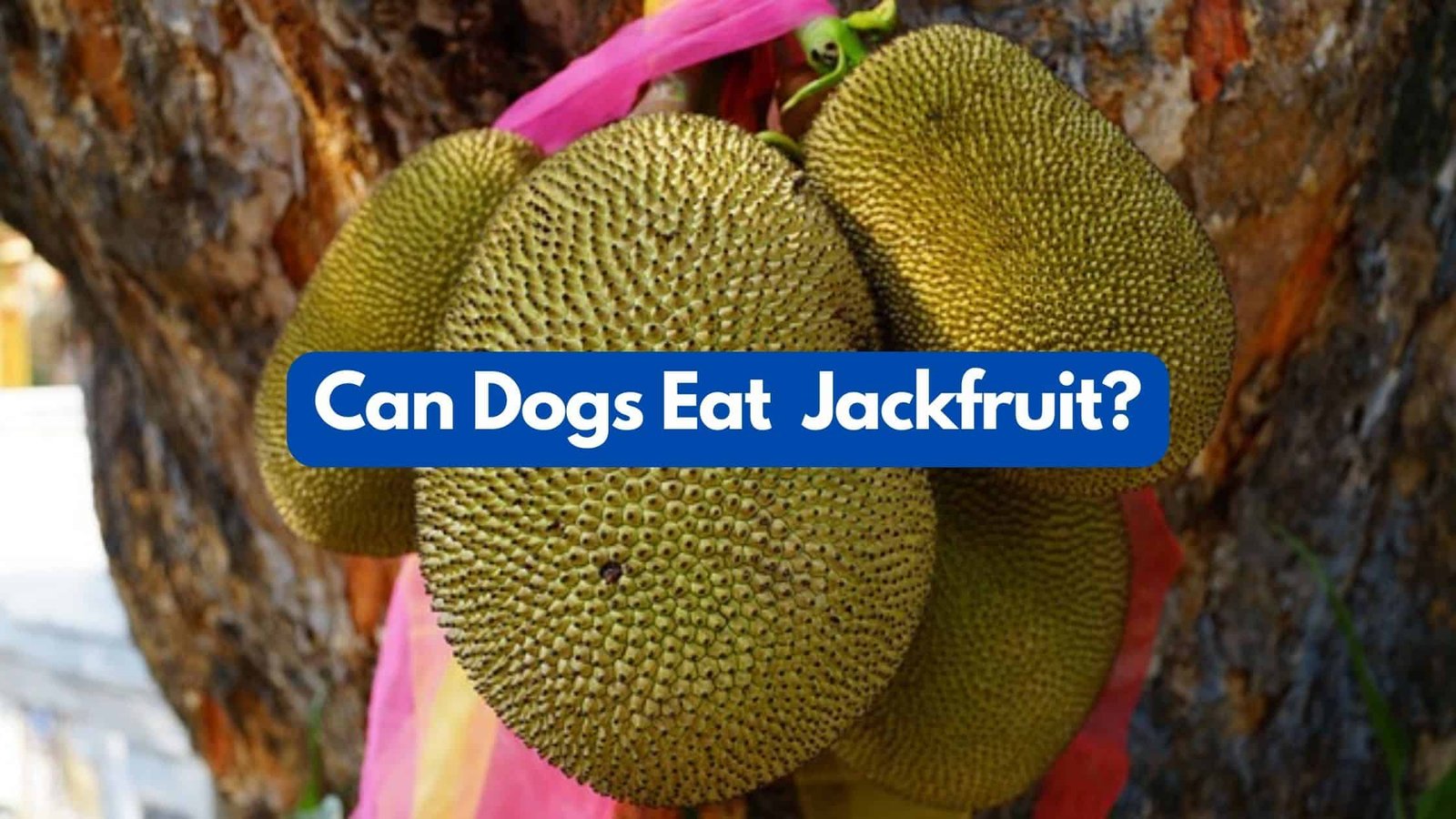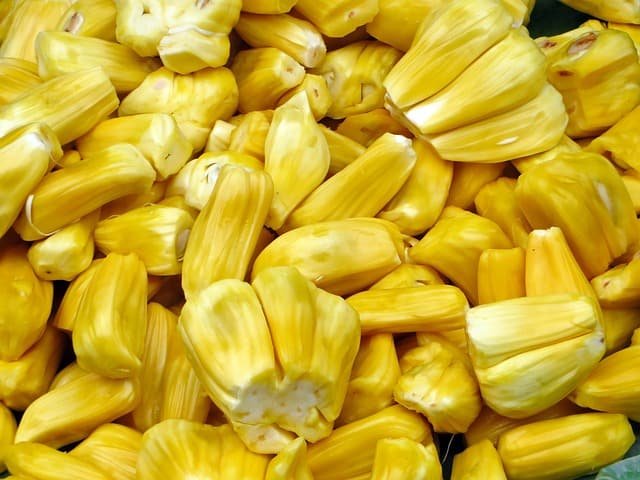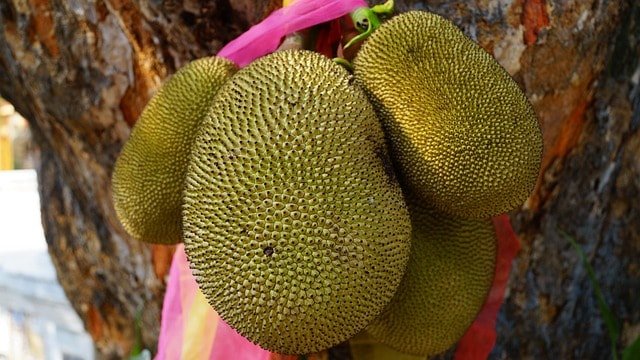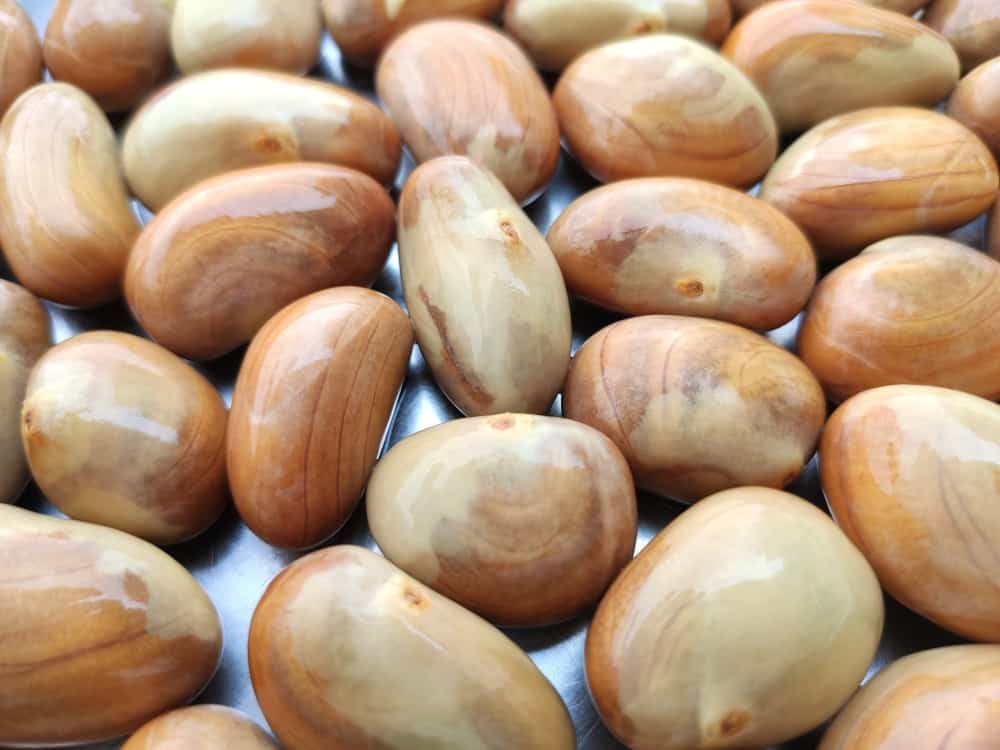Can Dogs Eat Jackfruit? Get the Facts Here!

Are you a dog owner who loves exploring new foods and flavors? If yes, then you may have wondered if it’s safe to share some exotic fruits with your furry friend, like jackfruit. As a result, you ask questions like “Can dogs eat jackfruit? Or Is it jackfruit safe for dogs?
As a responsible pet owner, it’s essential to ensure that every treat you offer your beloved canine is safe and beneficial for their health. In this informative guide, we’ll delve into the world of jackfruit and its compatibility with our four-legged companions. From the nutritional value of jackfruit to potential risks and precautions, we’ll provide you with all the insights you need to make an informed decision.
So, grab a cup of tea, and let’s explore the delightful world of jackfruit for dogs together!
Can Dogs Eat Jackfruit?
Yes, dogs can eat jackfruit in moderation. Jackfruit is a tropical fruit packed with essential nutrients like fiber, vitamin C, and potassium. When feeding jackfruit to your dog, it’s important to remove the seeds and the tough outer skin, as they can be difficult to digest.
The sweet, fleshy part of the fruit can be a tasty and healthy treat for your canine companion. However, due to its high sugar content, jackfruit should be given in small portions to avoid upsetting your dog’s stomach or causing digestive issues. Additionally, it’s always recommended to introduce new foods gradually and monitor your dog for any adverse reactions.
Read also, Can Dogs Eat Dragon Fruits? What Are The Benefits And Risk To Dogs?

Can puppies eat jackfruit?
Puppies can eat jackfruit in moderation, but it’s important to exercise caution. While jackfruit is generally safe for dogs, puppies have more sensitive digestive systems and may experience difficulty digesting certain fruits, including jackfruit.
It’s best to wait until your puppy is at least four to six months old before introducing any new foods, including jackfruit. Start with small amounts and monitor your puppy for any signs of gastrointestinal upset or allergies.
If your puppy experiences any adverse reactions, such as vomiting or diarrhea, it’s recommended to discontinue feeding jackfruit and consult with your veterinarian for further guidance.
Potential Benefits of Feeding Jackfruit to Dogs
Feeding dogs jackfruit can offer several benefits for their overall health and well-being. Here are some potential advantages:
1. Jackfruit is rich in good nutrients for dogs:
Jackfruit is rich in essential nutrients like fiber, vitamin C, potassium, and antioxidants. These nutrients can support your dog’s immune system, promote healthy digestion, and contribute to its overall vitality.
2. Jackfruit is a natural energy booster for dogs:
The natural sugars present in jackfruit can provide a quick energy boost to your canine friend. This can be especially beneficial during activities like training sessions or long walks.
3. Jackfruits are low in fat and suitable for dogs:
Jackfruit is low in fat, making it a suitable treat for dogs that require a low-fat diet. It can be a healthier alternative to many commercially available dog treats that may be high in unhealthy fats and additives.
4. Jackfruit is rich in healthy dietary fiber:
The fiber content in jackfruit can aid in maintaining regular bowel movements and preventing constipation in dogs.
5. Jackfruit induces a variety of mental stimulations:
Offering your dog different flavors and textures, like jackfruit, can provide variety in their diet and stimulate their senses, keeping them mentally engaged and satisfied.
Also, read; Can Dogs Eat Mulberries? 6 Awesome Benefits

Potential Risks of Feeding Jackfruit to Dogs
While jackfruit can be safe for dogs when given in moderation, there are some potential risks to be aware of. Here are six possible risks associated with feeding jackfruit to dogs:
1. It may cause allergic reactions:
Just like humans, dogs can have allergies to certain foods, including jackfruit. Allergic reactions may manifest as itching, hives, swelling, difficulty breathing, or gastrointestinal upset. If your dog shows any signs of an allergic reaction, discontinue feeding jackfruit and seek veterinary assistance.
2. It may lead to digestive issues in dogs:
Jackfruit contains a high amount of natural sugars and fiber, which can be difficult for some dogs to digest. Feeding large amounts or introducing jackfruit too quickly into their diet may result in stomach upset, diarrhea, or even pancreatitis in more severe cases.
3. Your dogs may choke on the seeds:
Jackfruit seeds are not easily digestible and can pose a choking hazard or cause intestinal blockages if ingested by dogs. Always remove seeds before offering jackfruit to your furry friend.
4. The high sugar content can make your dog obese:
Jackfruit is relatively high in natural sugars, which can lead to weight gain and potential dental issues in dogs if consumed excessively. It’s important to feed jackfruit in moderation and consider your dog’s overall diet and health.
5. Unripe jackfruit may be difficult to digest:
Unripe jackfruit contains a compound called latex, which can be difficult for dogs to digest and may cause gastrointestinal disturbances. Stick to feeding ripe jackfruit, as it is easier on their stomach.
6. Dogs with pre-existing health conditions may have individual sensitivities:
Each dog is unique, and some may have individual sensitivities or pre-existing health conditions that could make them more susceptible to the risks associated with jackfruit consumption. It’s always advisable to consult with your veterinarian before introducing any new food to your dog’s diet.
How to Feed Dogs Jackfruit
Feeding jackfruit to your dog can be done with these simple steps:
- Choose ripe jackfruit: Select a ripe jackfruit that is sweet and fragrant. Avoid unripe or overripe fruits, as they may cause digestive issues.
- Remove seeds and skin: Cut the jackfruit into manageable pieces and remove the seeds and tough outer skin. Jackfruit seeds are not easily digestible for dogs and can pose a choking hazard.
- Cut into small portions: Slice the sweet, fleshy part of the jackfruit into small, bite-sized pieces suitable for your dog’s size and chewing abilities. This ensures easier digestion and reduces the risk of choking.
- Introduce gradually: Start by offering a small amount of jackfruit as a treat or mix it into your dog’s regular meals. Watch for any adverse reactions or digestive issues.
- Monitor your dog: Observe your dog’s response to jackfruit. If they enjoy it and tolerate it well, you can continue incorporating it into their diet occasionally. However, if any signs of allergies or digestive upset occur, discontinue feeding jackfruit and consult your veterinarian.
- Moderation is key: Remember to feed jackfruit to your dog in moderation. Due to its high sugar content, too much jackfruit can lead to weight gain or upset stomach. Balance is crucial for a healthy diet.

Jackfruit for Dogs with Special Dietary Needs
As a veterinarian, I understand that some dogs have special dietary needs that require careful consideration when introducing new foods like jackfruit. Let’s explore how jackfruit can be incorporated into the diets of dogs with specific dietary requirements.
1. Jackfruit for dogs with allergies
If your dog has known allergies or sensitivities to certain foods, it’s essential to exercise caution when introducing jackfruit. While jackfruit allergies in dogs are rare, it’s always a good idea to start with a small portion and closely monitor your furry friend for any signs of an allergic reaction, such as itching, swelling, or gastrointestinal issues. If you notice any adverse reactions, discontinue feeding jackfruit and consult with your veterinarian for alternative options.
2. Jackfruit for dogs with diabetes
Dogs with diabetes require careful management of their sugar intake. Due to its natural sugar content, jackfruit may not be suitable for dogs with diabetes. It’s crucial to consult with your veterinarian before offering jackfruit to your diabetic dog. They can provide guidance on appropriate fruit choices that align with your dog’s dietary needs and help maintain stable blood sugar levels.
3. Jackfruit for dogs with digestive issues
For dogs with sensitive stomachs or pre-existing digestive issues, introducing jackfruit should be done with caution. The fiber content in jackfruit can be beneficial for regular bowel movements; however, some dogs may experience gastrointestinal upset or loose stools if given too much or if they have difficulty digesting fiber-rich foods. Start with small portions and closely monitor your dog’s digestion. If any issues arise, discontinue feeding jackfruit and consult with your veterinarian for appropriate alternatives.

Alternatives to Jackfruit for Dogs
When considering alternatives to jackfruit for dogs, there are various options that can provide similar nutritional benefits. Here are six alternatives and the reasons why they can be suitable for your furry friend:
- Apples: Apples are a great alternative to jackfruit. They are low in calories and high in fiber, promoting healthy digestion in dogs. Plus, the crunchy texture can help clean your dog’s teeth.
- Blueberries: Blueberries are packed with antioxidants, vitamins, and fiber. They make for a tasty and nutritious treat for dogs. These bite-sized fruits can support their immune system and overall health.
- Pumpkin: Pumpkin is an excellent alternative, especially for dogs with digestive issues. It’s rich in fiber and can help regulate bowel movements. Additionally, pumpkin is known to be gentle on the stomach.
- Watermelon: Watermelon is a hydrating and refreshing option for dogs. It contains high water content, aiding in hydration during hot summer days. Remove the seeds and offer small, seedless pieces as a juicy treat.
- Carrots: Carrots are crunchy, low in calories, and rich in vitamins. They serve as a great alternative to jackfruit, providing dogs with a satisfying chew and promoting dental health.
- Sweet potatoes: Sweet potatoes are a nutritious and delicious alternative. They are packed with vitamins, minerals, and dietary fiber. They can be cooked and served as a tasty treat or added to your dog’s meals.
Frequently Asked Questions Related to “Can Dogs Eat Jackfruit?”
Can Dogs Eat Cooked Jackfruit?
Yes, dogs can eat cooked jackfruit. However, it’s important to ensure that the jackfruit is ripe and properly cooked without any added seasonings or ingredients that may be harmful to dogs, such as garlic or onions.
Can Dogs Eat Dried Jackfruit?
While small amounts of dried jackfruit may be safe for dogs, it’s best to avoid feeding them dried fruits in general. Dried jackfruit can be high in sugar and may have additives or preservatives that are not suitable for dogs.
Can Dogs Eat Jackfruit Chips?
It’s best to avoid feeding dogs jackfruit chips. Jackfruit chips are typically fried and may contain added oils, seasonings, or salt that can harm dogs. Stick to feeding fresh, ripe jackfruit in small portions.
Can Dogs Eat Jackfruit Meat?
Yes, dogs can eat the fleshy part of jackfruit, known as jackfruit meat. Ensure that the jackfruit is ripe, and properly cleaned, and the tough outer skin and seeds are removed before offering it to your dog. Moderation is key.
Can Dogs Eat Jackfruit Seeds?
No, dogs should not eat jackfruit seeds. Jackfruit seeds are not easily digestible and can pose a choking hazard or cause intestinal blockages if ingested by dogs. Always remove the seeds before feeding jackfruit to your dog.
Can Dogs Eat Unripe Jackfruit?
It is not recommended to feed dogs unripe jackfruit. Unripe jackfruit contains a compound called latex, which can be difficult for dogs to digest and may cause gastrointestinal disturbances. Stick to feeding ripe jackfruit to your dog.
Can Dogs Eat Canned Jackfruit?
Canned jackfruit is not recommended for dogs. Canned fruits often contain added sugars, syrups, or preservatives that can be harmful to dogs. It’s best to stick to fresh, ripe jackfruit in its natural form.
Can Dogs Eat Jackfruit Ice Cream?
No, dogs should not consume jackfruit ice cream or any other ice cream meant for human consumption. Ice cream typically contains ingredients like dairy, sugar, and additives that can upset a dog’s stomach and potentially lead to health issues.
Can Dogs Eat Jackfruit Jam or Jelly?
It’s best to avoid feeding dogs jackfruit jam or jelly. These products often contain high amounts of sugar or artificial sweeteners, which can be harmful to dogs. Stick to feeding fresh jackfruit in moderation.
Can Dogs Eat Jackfruit Skin?
No, dogs should not eat jackfruit skin. The skin is tough and difficult to digest for dogs. It’s important to remove the skin and offer only the ripe, fleshy part of the jackfruit to your dog.
Can Dogs Eat Jackfruit Leaves?
No, dogs should not eat jackfruit leaves. The leaves are not suitable for canine consumption and may cause digestive upset or other adverse reactions. Stick to feeding your dog the ripe flesh of the jackfruit.
Can Dogs Eat Jackfruit Pits?
No, dogs should not eat jackfruit pits or the inner core. These parts of the jackfruit are hard and can pose a choking hazard or cause damage to your dog’s teeth. Always remove pits and the tough inner core before feeding jackfruit to your dog.
Can Dogs Eat Jackfruit in Large Quantities?
No, it’s not recommended to feed dogs large quantities of jackfruit. While jackfruit can be a healthy addition to their diet in moderation, excessive consumption may lead to digestive upset, weight gain, or other health issues. Stick to small, occasional portions to avoid any potential problems.
Conclusion – Can Dogs Eat Jackfruit?
In conclusion, jackfruit can be a safe and nutritious treat for dogs when given in moderation. It is packed with essential nutrients like fiber, vitamin C, and potassium, providing several potential benefits for their health. However, it’s crucial to remove the seeds and tough outer skin and feed only the ripe, fleshy part of the fruit. Don’t forget to monitor your dog for any adverse reactions and introduce new foods gradually.
While jackfruit offers advantages such as being a natural energy booster, low in fat, and rich in healthy dietary fiber, it’s important to be aware of potential risks, including allergies, digestive issues, and choking hazards. As always, consult with your veterinarian before introducing any new food to your dog’s diet. Remember, balance and moderation are key to ensuring a healthy and enjoyable diet for your furry companion.





